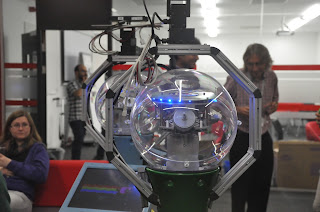The paper titled "Lessons Learned from the Deployment of a Long-term Autonomous Robot as Companion in Physical Therapy for Older Adults with Dementia: A Mixed Methods Study", authored by STRANDS members Denise Hebesberger (STRANDS partner AAF), Christian Dondrup (UOL) , Tobias Koertner (AAF), Christoph Gisinger (AAF), and Juergen Pripfl (AAF) presents findings from the long-term deployment of a STRANDS robot in the Austrian Care Home "Haus der Barmherzigkeit" during the second year of the project. It focused on the analysis of one of the robot's tasks, namely the so-called "walking group", an implementation of occupational therapy developed in collaboration with the therapists on site.
Abstract:
The eldercare sector is a promising deployment area for robotics where robots can support staff and help to bridge the predicted staff-shortage. A requirement analysis showed that one field of robot deployment could be supporting physical therapy of older adults with advanced dementia. To explore this possibility, a long-term autonomous robot was deployed as a walking group assistant at a care site for the first time. The robot accompanied two weekly walking groups for a month, offering visual and acoustic stimulation. Therapists' experience, the robot's influence on the dynamic of the group and the therapists' estimation of the robot's utility were assessed by a mixed methods design consisting of observations, interviews and rating scales. Findings suggest that a robot has the potential to enhance motivation, group coherence and also mood within the walking group. Furthermore, older adults show curiosity and openness towards the robot. However, robustness and reliability of the system must be high, otherwise technical problems quickly turn the robot from a useful assistant into a source of additional workload and exhaustion for therapists.











